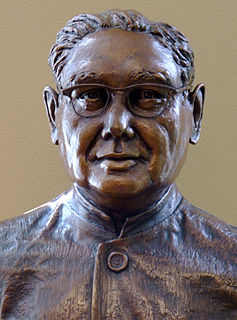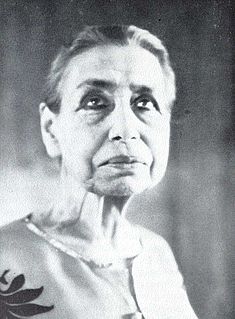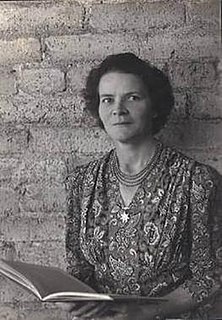
Auroville is an experimental township in Viluppuram district mostly in the state of Tamil Nadu, India with some parts in the Union Territory of Puducherry in India. It was founded in 1968 by Mirra Alfassa and designed by architect Roger Anger. As stated in Alfassa's first public message in 1965,
Auroville wants to be a universal town where men and women of all countries are able to live in peace and progressive harmony, above all creeds, all politics and all nationalities. The purpose of Auroville is to realize human unity.
Satprem was a French author and a disciple of Mirra Alfassa.
Georges Van Vrekhem was a Flemish Belgian journalist, poet and playwright, who was the artistic manager of a professional theater company, the "Nederlands Toneel te Gent". He became acquainted with the teachings of Sri Aurobindo and the Mother in 1964. In 1970 he joined the Sri Aurobindo Ashram in Puducherry, and eight years later, in 1978 he moved to Auroville. He has translated as selected writings from the Ramayana and the Mahabharata and several books of Sri Aurobindo, The Mother, Peter Heehs, and Satprem into Dutch. Van Vrekhem died during sleep in his Auroville home in Shakti on 31 August 2012.

Integral yoga, also called supramental yoga, is the yoga-based philosophy and practice of Sri Aurobindo and The Mother. Sri Aurobindo finds that there has always been impulse or longings in humans in search for God, Light, Bliss, Freedom, Immortality which has presented itself in a right place in a sequence, which Nature is seeking to evolve beyond mind. This sequence on one end which depicts Life is already involved in Matter and mind in life, leading to the understanding that currently the mind is also a veil of higher states which are beyond mind. Nature via the said impulses would gradually prepare for a higher living and a diviner life.

The Sri Aurobindo Ashram is a spiritual community (ashram) located in Pondicherry, in the Indian territory of Puducherry. The ashram grew out of a small community of disciples who had gathered around Sri Aurobindo after he retired from politics and settled in Pondicherry in 1910. On 24 November 1926, after a major spiritual realization, Sri Aurobindo withdrew from public view in order to continue his spiritual work. At this time he handed over the full responsibility for the inner and outer lives of the sadhaks and the ashram to his spiritual collaborator, "The Mother", earlier known as Mirra Alfassa. This date is therefore generally known as the founding-day of the ashram, though, as Sri Aurobindo himself wrote, it had "less been created than grown around him as its centre."

Haridas Chaudhuri, a Bengali integral philosopher, was a correspondent with Sri Aurobindo and the founder of the California Institute of Integral Studies (CIIS).
Xu Fancheng, Courtesy name Jihai, also known as Hu Hsu and F.C. Hsu in India, was a Chinese scholar and translator, indologist and philosopher. He translated 50 of the Upanishads into classical Chinese. He also translated Nietzsche's Also sprach Zarathustra, Kalidasa's lyric poem Meghaduuta, and several of Sri Aurobindo's works into Chinese. He was familiar with Greek, Latin, English, French, as well as Sanskrit and German. A 16-volume edition of his complete works was published in 2006.
Arya: A Philosophical Review was a 64-page monthly periodical written by Sri Aurobindo and published in India between 1914 and 1921. The majority of the material which initially appeared in the Arya was later edited and published in book-form as The Life Divine, The Synthesis of Yoga, The Secret of the Veda, The Foundations of Indian Culture and The Ideal of Human Unity as well as a number of translations of Vedic literature.
Robert Lawlor is a mythographer, symbologist and New Age author of several books.
Ambulal Balkrishna Purani was an Indian writer. He was a prominent disciple and biographer of Sri Aurobindo.

Mangesh Vithal Nadkarni (1933–2007) was a professor of English literature, and a disciple of Sri Aurobindo. He lectured on Sri Aurobindo's philosophy and vision

Mirra Alfassa, known to her followers as The Mother, was a French spiritual guru, an occultist and a collaborator of Sri Aurobindo, who considered her to be of equal yogic stature to him and called her by the name "The Mother". She founded the Sri Aurobindo Ashram and established Auroville as a universal town; she was an influence and inspiration to many writers and spiritual personalities on the subject of Integral Yoga.

Sri Aurobindo was an Indian philosopher, yogi, maharishi, poet, and Indian nationalist. He joined the Indian movement for independence from British rule, till 1910 was one of its influential leaders and then became a spiritual reformer, introducing his visions on human progress and spiritual evolution.
Supermind, in Sri Aurobindo's philosophy of integral yoga, is the dynamic manifestation of the Absolute, and the intermediary between Spirit and the manifest world, which enables the transformation of common being into Divine being.

Pondicherry is the capital city of The Union Territory of Puducherry and is one of the most popular tourist destinations in South India.
Kireet Joshi was an Indian philosopher, and disciple of Sri Aurobindo and Mirra Alfassa. In 1976, the Prime Minister of India, Indira Gandhi, appointed Kireet as Education Advisor to the Government of India. He also served as the Chairman of the Indian Council of Philosophical Research.

Sri Aurobindo Ashram Mahasua run by 'SriAurobindo Samiti Mahasua' is a temple of Sri Aurobindo and The Mother of Sri Aurobindo Ashram Pondicherry. It is situated on National Highway No.7 only 16 km from Rewa towards Allahabad in Madhya Pradesh (India). Sri Aurobindo's sacred relics were installed here on 31.11.1975 on the auspicious day of Deepawali. Since then, Sri Aurobindo Bal Vidya Mandir, Mira Aditi Shishu Chhatrawas, Sri Aurobindo Library, Aradhana and Sadhana have evolved as component parts of Ma Mandir.

Judith Tyberg (1902–1980) was an American yogi ("Jyotipriya") and a renowned Sanskrit scholar and orientalist. Author of The Language of the Gods and two other reputed texts on Sanskrit, she was the founder and guiding spirit of the East-West Cultural Center in Los Angeles, California, a major pioneering door through which now-celebrated Indian yogis and spiritual teachers of many Eastern and mystical traditions were first introduced to America and the West.
Thomas Aykara CMI is the rector of Dharmaram College in Bengaluru, India. He is a Catholic priest of the Syro-Malabar Church. He joined the Carmelites of Mary Immaculate (CMI)Carmelites of Mary Immaculate congregation, St. Joseph's Province Kottayam in 1954. He is a philosopher, theologian and religious. He is a scholar, teacher, author and thinker. Several academic centres in India and abroad originated through the efforts of Thomas Aykara.